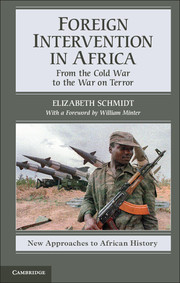Book contents
- Frontmatter
- Contents
- Illustrations
- Acknowledgments
- Foreword
- Abbreviations
- MAP 0.1. Africa, 1947. (Map by Philip Schwartzberg, Meridian Mapping, Minneapolis.)
- MAP 0.2. Africa, 2011. (Map by Philip Schwartzberg, Meridian Mapping, Minneapolis.)
- Introduction
- 1 Nationalism, Decolonization, and the Cold War, 1945–1991
- 2 Egypt and Algeria Radical Nationalism, Nonalignment, and External Intervention in North Africa, 1952–1973
- 3 The Congo Crisis, 1960–1965
- 4 War and Decolonization in Portugal's African Empire, 1961–1975
- 5 White-Minority Rule in Southern Africa, 1960–1990
- 6 Conflict in the Horn, 1952–1993
- 7 France's Private African Domain, 1947–1991
- 8 From the Cold War to the War on Terror, 1991–2010
- Conclusion
- Index
- References
4 - War and Decolonization in Portugal's African Empire, 1961–1975
Published online by Cambridge University Press: 05 February 2013
- Frontmatter
- Contents
- Illustrations
- Acknowledgments
- Foreword
- Abbreviations
- MAP 0.1. Africa, 1947. (Map by Philip Schwartzberg, Meridian Mapping, Minneapolis.)
- MAP 0.2. Africa, 2011. (Map by Philip Schwartzberg, Meridian Mapping, Minneapolis.)
- Introduction
- 1 Nationalism, Decolonization, and the Cold War, 1945–1991
- 2 Egypt and Algeria Radical Nationalism, Nonalignment, and External Intervention in North Africa, 1952–1973
- 3 The Congo Crisis, 1960–1965
- 4 War and Decolonization in Portugal's African Empire, 1961–1975
- 5 White-Minority Rule in Southern Africa, 1960–1990
- 6 Conflict in the Horn, 1952–1993
- 7 France's Private African Domain, 1947–1991
- 8 From the Cold War to the War on Terror, 1991–2010
- Conclusion
- Index
- References
Summary
While its NATO allies focused on the Congo, Portugal had its own African concerns. By the early 1960s, it was clear that France, Britain, and Belgium could maintain neocolonial economic relationships with their African colonies without the hassles of political control. With growing demands for economic development and burgeoning political unrest, independence had become an attractive option for both colonizer and colonized. For Portugal, ruled by the fascist dictatorship of António Salazar since 1932, African independence was out of the question. In contrast to its northern European counterparts, Portugal was an impoverished country with an underdeveloped economy. However, it maintained the illusion of grandeur with significant African possessions: Portuguese Guinea and the strategically important island of Cape Verde in West Africa and its environs; the islands of São Tomé and Príncipe off the coast of Central Africa; and Mozambique and Angola in Southern Africa. Without the cheap labor and raw materials that resulted from a harsh forced labor regime, Portugal's industries would not be profitable. Unable to compete in an unprotected market, Portugal was determined to retain political control of its colonies. With the exception of their settler colonies, France, Britain, and Belgium generally acquiesced to political independence without armed struggle. Portugal, in contrast, considered its colonial possessions to be overseas provinces akin to French Algeria and waged devastating colonial wars to retain them. This chapter examines the national liberation movements and external actors in Portugal's three mainland colonies; the transformations in American policy toward its NATO ally; and the contours of the struggles in Portuguese Guinea, Mozambique, and Angola.
- Type
- Chapter
- Information
- Foreign Intervention in AfricaFrom the Cold War to the War on Terror, pp. 78 - 101Publisher: Cambridge University PressPrint publication year: 2013



